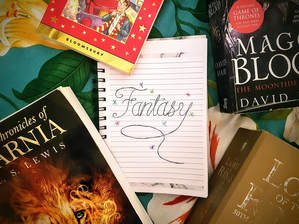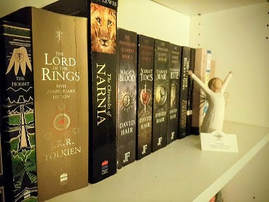|
13/9/2017 1 Comment Genre: fantasy Fantasy is a genre many people will have encountered. Literature that involve fantasy provide a world away from our own, a world that is distinctly different and is unattainable in real life. They involve rules and laws unlike ours, and creatures that we wish to see but never will. They can either be completely new worlds, such as Urte in The Moontide Quartet by David Hair and Westeros in A Song of Ice and Fire by George R R Martin, or worlds that are connected to ours but are only available to some, such as Hogwarts in the Harry Potter series by J K Rowling. However, there is more to fantasy than this and the complexities of it make it one of the hardest genres to successfully produce. Why? Well, anyone can write a fantasy story. On the surface, it seems pretty easy. A writer can make up whatever they like and put it into a book and, boom, it's a fantasy... right? Yes and no. There are other genres out there that are similar to fantasy, such as science fiction and utopia/dystopia novels, so what the writer 'makes up' has to avoid delving into those. There is also the history that comes with any created world. When we're born isn't when the world begins. There is a history before us that we can learn. This is the same in fantasy. As human-beings we are inquisitive and curious, so if we are to read a book or watch a film that involves a world other than our own we will question the lore and reason behind it. What about the languages? The religions? There are many layers to a fantasy, and this is where the complexities lie.  Successful fantasy stories, such as The Lord of the Rings by J R R Tolkien and the Harry Potter series by J K Rowling, address these carefully without sliding into the other genres. Their ability to create characters, creatures and more in their individual worlds is what makes them believable, and the consistency with facts avoids plot holes and conflicts that distinctly divides their success to other fantasy writers. When readers and fans ask a writer questions about a fantastical story they have written, the answers have to make sense and not cause doubt in the new reality created. So not only does a writer have to write their main story but they have to create its history, meaning lots of little stories and characters that have as much importance as the main storyline. So how does fantasy differ from genres like science fiction or utopia/dystopia? To quickly summarise without delving too far into the other genres, science fiction involves new worlds and creatures like fantasy but generally focuses on scientific and technological advancements whereas utopia/dystopia's are set in the near or far future and establish a world that either eliminates real world problems or accentuates them with the intention to emphasise the problems in the existing world. Fantasy disconnects from reality and form new ones where readers can escape from their real world problems into a setting where they can live heroic lives through the characters. Another factor of fantasy is magic. Not all fantasies involve 'hocus-pocus' magic with wands, warlocks and witches, but there generally is some form of it, like mystical creatures or talking animals. This can be direct where the characters are involved in the use of magic, or it can be indirect where the magic lies away from the characters and derives from the environment. The magic creates a mysticism and is an easy way to distinguish the world as one away from the real world. This also links to the aspect of fantastical creatures. Dragons, centaurs, goblins, trolls, orcs, lamiae... the list goes on. These creatures are another way that distinguish the fantasy world from our own, and writers are able to take mystical creatures from myth and legend or create their own depending on their story. However, using these creatures raises mores questions for the writer. Why are the creatures there? Do they serve a purpose? How did they begin to exist? Again, if the answers don't run inline with the story, the reader will begin to doubt it. There is also the concept of language. In a world that is completely different from our own, would the inhabitants speak in English or would they speak in a language that doesn't exist? Creating a new language requires a lot of research on how languages work and this can be very difficult. If a fantasy story becomes popular and a fan base is created, some people might try and learn the language that has been created (The Lord of the Rings is a good example of this). Not only does a language have to be created, but so do grammatical conventions and the linguistic concepts around it. As I wrote before, there are many layers that encapsulate a fantasy. If you take any fantasy out there and start to analyse each layer, the complexities become apparent. For it to have the best chance on being successful, all aspects have to be considered for there to be no plot holes or doubt within the readers mind as they experience the world that has been created. So what do I suggest to keep in mind when writing a fantasy story? Well, I'm not a professional nor am I very good at writing them myself. However, I would recommend reading a lot of fantasy books and taking note on how the story highlights the fantastical elements and provides you with the correct knowledge to understand these foreign concepts. When you start writing, have a rough idea on the world you're creating and the possible history of it, and then let yourself write what you want. Whenever you want to add something in, make sure there is a reason for it. If it's a concept that doesn't really connect with what you have created, edit and change the original idea to fit it in, or you can write down the concept and use it in another story. You don't have to have the whole world completely created from the beginning. Nonetheless, having a base idea and doing some research never goes astray. Hopefully this first instalment of the 'genre' series provides you with some understanding on the complexities of fantasy stories. If you have any questions, let me know. I'd also love to hear from you about any suggestions for future instalments in this series of if you have any other ideas for content that is similar to this. Be sure to let yourself ignite the story and enjoy the worlds that fantasy writer's create for us to experience, or try and create one yourself!
1 Comment
|
AuthorCharlotte is a reading and writing lover who has completed a creative writing intensive course at the University of Oxford and is a current university student studying a double degree in journalism and creative writing. If you are curious to learn more, check out the 'About' page. Archives
January 2019
Categories |
 RSS Feed
RSS Feed